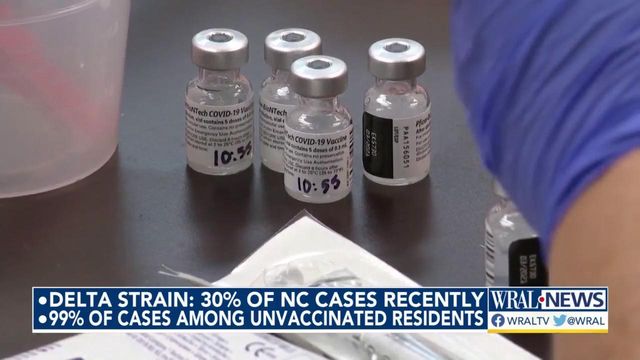Few NC counties have more than half of population vaccinated as Delta fears worsen
Health officials say that you should be looking closely at the number of fully vaccinated people in your area as the newest strain of coronavirus is rapidly spreading. The US is now averaging more than 16,000 new COVID cases per day, an increase of more than 21% in just the last week.
Posted — UpdatedThe Centers for Disease Control and Prevention says that the Delta variant of the COVID-19 virus is about 40% to 60% more transmittable than the initial strain of COVID-19. These cases continue to surge among unvaccinated populations in the South.
People who are living in areas with low vaccination rates — even if they are vaccinated — could be at risk of getting infected, said emergency physician Dr. Leana Wen with George Washington University's Milken Institute School of Public Health. Breakthrough infections are possible even after someone is vaccinated, though research shows coronavirus vaccines are almost entirely effective at preventing severe illness or hospitalization.
In most North Carolina counties outside of the Triangle, less than 50% of residents are fully vaccinated. Wake, Orange and Durham counties have more than half the population vaccinated, but Johnston, Wilson and Harnett counties have vaccination rates under 40%.
Dr. Anthony Fauci, the nation's top infectious disease expert, said this month that if someone is in a community where not many people are vaccinated, it may be appropriate to mask up.
State health officials say the Delta strain has accounted for nearly 30% of coronavirus infections in recent weeks – and they expect that number to rise. Since May, more than 99% of new COVID cases in the state are among those who are not fully vaccinated.
If the Delta variant continues to spread, and vaccination rates don't increase, masks and social distancing could return, experts say. New COVID cases in North Carolina have jumped 52% over the past week.
Vaccinations in North Carolina have mostly stalled at around 50%, which is below the national average. Experts believe immunity is achieved when more than 70% of the population is protected from the virus with a vaccine.
Around 20% of young adults, ages 18 to 34, say they are uncertain on getting the coronavirus vaccine. State data shows that only 53% of people 18 years and older are vaccinated, compared to 80% of people 65 years and older.
More young people are now having to be hospitalized with COVID-19 as the Delta variant spreads. Medical experts are seeing that the Delta variant is more severe, and attacks patients faster than the previous strain of COVID.
In Missouri, only about 40% of the population is fully vaccinated. About 91% of the patients in the intensive care unit at Mercy Hospital in Springfield are on ventilators, Chief Administrative Officer Erik Frederick said. The majority of them are young adults.
"That is shocking to us, to have that kind of number," Frederick said Saturday. "These are young patients -- you have them in their 20s, 30s, 40s -- again, it's alarming, (and) a direct line to the vaccination rates."
• Credits
Copyright 2024 by WRAL.com and CNN. All rights reserved. This material may not be published, broadcast, rewritten or redistributed.






